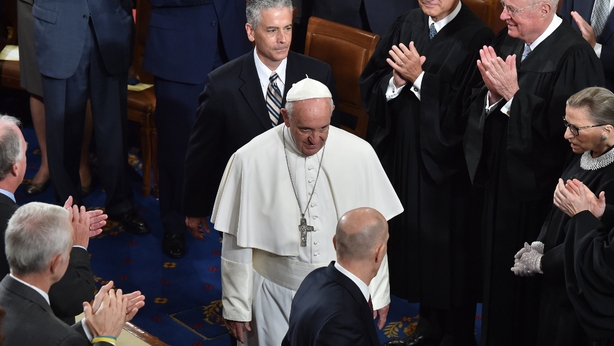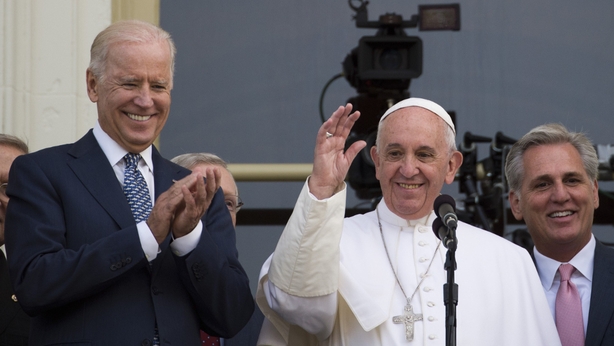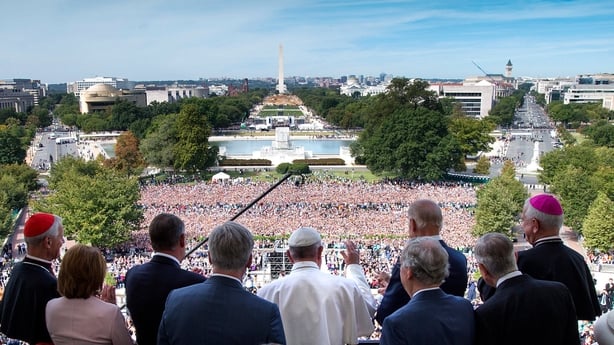Pope Francis has arrived in New York on the second leg of his US tour where he will address the UN General Assembly, visit the 9/11 Memorial and celebrate mass at Madison Square Garden.
The pontiff arrived from Washington DC, arriving at John K. Kennedy Airport, named after America's first Catholic president who was assassinated in 1963.
He travelled on an American Airlines Boeing 777, given the call sign Shepherd One for its illustrious passenger in a nod to his tending to his Catholic flock.
The 78-year-old Argentine pontiff was greeted by delighted cheers as he stepped from the plane in his papal whites, and shook hands with members of the clergy on the tarmac.
He is to be flown by helicopter to lower Manhattan and then drive by motorcade to St Patrick's Cathedral, which stands in opulence on Fifth Avenue surrounded by luxury boutiques.
He will lead evening prayers at the cathedral, where he will be greeted by church leaders and New York dignitaries.
His 36-hour visit to New York will continue on Friday with an address to the UN General Assembly.
He will then lead an inter-faith service at the 9/11 Memorial, visit a Catholic school in Harlem, process through crowds in Central Park and celebrate mass at Madison Square Garden.
Earlier today Pope Francis made a historic address to US Congress, addressing hundreds of politicians a day after his talks with President Barack Obama at the White House.
It was the first time the leader of the Roman Catholic Church has addressed a joint meeting of Congress.
In his address he touched on many controversial issues including immigration, the death penalty, marriage, global conflict and global warming.
He said that the world was facing a refugee crisis "of a magnitude not seen since the Second World War", not only in Europe and the Middle East but also in the US where migrants flow from Latin and Central America.
He urged people not to be "taken aback" by their numbers, but to view migrants and refugees as individuals.
He also told Congress that immigrants should always be treated "in a way which is always humane, just and fraternal".
He urged politicians to reject a "mindset of hostility" on immigration and to recognise people who wish to move to the United States as people who are trying to improve their lives and those of their families.
"Building a nation calls us to recognise that we must constantly relate to others, rejecting a mindset of hostility in order to adopt one of reciprocal subsidiarity," the 78-year-old Argentine-born pope said.
Standing ovation as Pope tells US Congress - 'most of us were once foreigners' https://t.co/7gVOwC5azE
— RTÉ News (@rtenews) September 24, 2015
The pontiff said he was reminding the Members of Congress of what he called "the Golden Rule" - of "Do unto others as you would have them do unto you", to which he received just one of many standing ovations.
He called for global vigilance against fundamentalism of all kinds, but warned a "delicate balance" must be struck between fighting extremists and preserving religious freedoms.
"We know that no religion is immune from forms of individual delusion or ideological extremism. This means that we must be especially attentive to every type of fundamentalism, whether religious or of any other kind," the pope said.
"A delicate balance is required to combat violence perpetrated in the name of a religion, an ideology or an economic system, while also safeguarding religious freedom, intellectual freedom and individual freedoms."
The Pope hailed the work of US civil rights leader Martin Luther King, saying his campaign still "inspires us all."
"I think of the march which Martin Luther King led from Selma to Montgomery 50 years ago as part of the campaign to fulfill his 'dream' of full civil and political rights for African Americans," he said.
"That dream continues to inspire us all. I am happy that America continues to be, for many, a land of 'dreams'."



Thousands of people gathered on the West Lawn of the Capitol in the hopes of catching a glimpse of Pope Francis after the speech and applauded loudly after he mentioned King.
Pope Francis also called for the global abolition of the death penalty
"The Golden Rule also reminds us of our responsibility to protect and defend human life at every stage of its development.
"This conviction has led me, from the beginning of my ministry, to advocate at different levels for the global abolition of the death penalty. I am convinced that this way is the best, since every life is sacred," he added.
"I also offer encouragement to all those who are convinced that a just and necessary punishment must never exclude the dimension of hope and the goal of rehabilitation."
He also urged US politicians to adopt "courageous actions and strategies" to counter climate change.
"I am convinced that we can make a difference, I'm sure, and I have no doubt that the United States - and this Congress - have an important role to play," he said.
Pope Francis also said that the institution of the family is under threat and young people are facing pressure not to start one.
"How essential the family has been to the building of this country. And how worthy it remains of our support and encouragement," he said, receiving a standing ovation from a joint session of Congress.
"Yet I cannot hide my concern for the family, which is threatened, perhaps as never before, from within and without."
To a standing ovation, he said there was a responsibility to protect and defend human life "at every stage of its development".
He also called for a "spirit of global solidarity" to tackle global poverty. But he said that the creation and distribution of wealth should not come at a cost to the environment.
Pope asks US Congress to give hope to people 'trapped in a cycle of poverty' https://t.co/0lGbMKyrRh
— RTÉ News (@rtenews) September 24, 2015
He said the United States - and Congress in particular - had an "important role to play" in averting the "most serious effects of the environmental deterioration caused by human activity".
He also called for an end to armed conflict throughout the world, and the arms trade.
Pope Francis asked the US Congress why deadly weapons were being sold "to inflict untold suffering", "simply for money", which he said was "money drenched in blood".
In the face of what he described as a "shameful and culpable silence", he said there was a "duty" to end the arms trade.
Alluding to the Iranian nuclear deal or the resumption of relations with Cuba, the Pope praised efforts made to "help overcome historic differences linked to painful episodes of the past".

